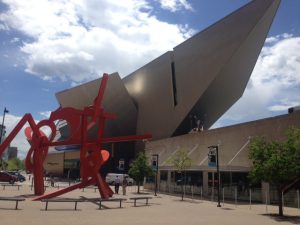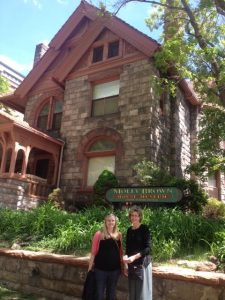This article is more than 5 years old.
Earlier this month, Joy and I attended the annual LOEX Conference in Denver, Colorado. Like previous years, this continues to be the standout library instruction conference and I’m so happy we were able to go.
Keynote
I would agree with Joy’s assessment that the opening keynote, presented by Anne-Marie Dietering, was one of the best I have heard. It was the highlight of the conference. If I had to identify a theme for it, it would be about challenging traditional narratives and binaries. Dietering has the full transcript available on her website, but here were some of my takeaways:
- It’s easy to build up a narrative of what “good” instructional practice looks like. Sometimes these narratives can be helpful, but they are just as easily stressful and harmful, especially when we accept assumptions like “any instruction librarian can fix any bad situation” and judge our performance accordingly
- Sometimes our assignment design can favor students that are already familiar with traditional assignment narratives (and by extension, good at telling the instructor what they want to hear). Additionally, some traditional assignment designs may result in students “performing” the act of an assignment (e.g. reflection) without actually engaging in the critical thinking the instructor intended. This alone has given me lots of food for thought when designing future assignments.
- Dietering challenged us to review potentially false binaries in our own teaching (popular vs. scholarly is an easy one to pick on) and how we might re-frame those conversations to include in-between spaces. This topic is very timely, considering the recent introduction of the new Framework for Information Literacy. I feel like I’m hearing lots of conversation in our profession about wanting to move away from teaching “checklists” into how to have more complex conversations about authority, inquiry, and scholarship.

For the rest of the conference I focused on two main goals: finding new potential learning activities for my LIB 100 classroom and listening to what other library’s are doing for instructional assessment.
Learning Activities:
- One session focused on developing your own “Choose Your Own Adventure” online game using the storyboarding tool, Twine.
- Another session discussed creating a “Source Stack” that consists of visual printouts of various library sources on a single research topic. The source stack can then be used for different in-class activities (e.g. information timeline, source evaluation)
- Joy covered the session on using satirical news sources to teach information literacy concepts, but here is the LibGuide that is cataloging some of these clips if you’d like to browse
Assessment
- I attended a very helpful session on pre/post test design since we are talking about including one as a LIB 100 assessment in the fall. The session was really on how to write better test questions — I’ve definitely fallen into the trap of writing pre-test questions that are too easy, which makes it hard to get good data on student learning over the length of the course. The presenter offered tips like utilizing plausible distractors for multiple-choice questions, randomizing the test questions, and potentially using open-ended questions graded with a rubric.
- Another session reviewed one library’s assessment of cited references (using a rubric) to measure student information literacy skills. I’ve done this kind of assessment before and I like it’s authenticity — it assesses the final product of student work. The main caveat is it’s rather time-intensive, and difficult to scale up, so it’s important to consider what the goals of the assessment are and how often/long to collect this type of data. .
- One library was using course registration data to learn more about their students and how many of them were getting repeat library sessions. While I think we usually avoid the “I’ve had this session before” conundrum at ZSR, my takeaway was that we could potentially use course registration data to “track” first-year students who’ve taken LIB 100. We might use this multiple ways, but I would be interested to see if taking LIB 100 has a positive impact on student performance in later classes (for example, a capstone research class). Grades might not tell us the whole story, so this might be an example of where the rubric assessment of student work could come in handy!


3 Comments on ‘Amanda at LOEX 2015’
Great write up-it sounds like a productive conference!
I would like to hear more about the pre/post test design session!
I love hearing about the assessment sessions, thanks!